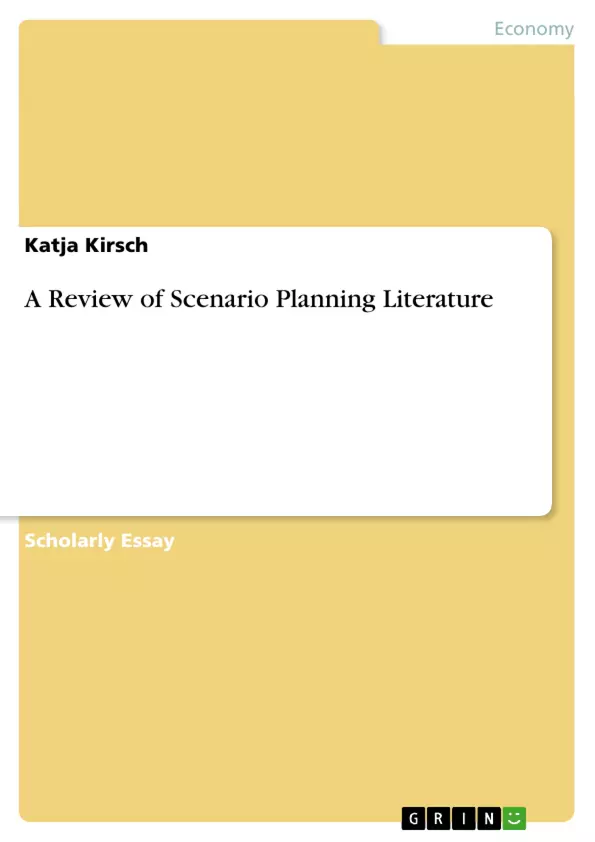Scenarios are increasingly popular within both companies and non-profit organisations. A wide variety of scenario characteristics and approaches has developed. In this paper a definition of the term scenario is given before exploring the different underlying assumptions and characteristics of, and approaches to scenario planning. It then goes on and identifies lacks in scenario theory to conclude with a future outlook of further research.
Inhaltsverzeichnis (Table of Contents)
- Introduction
- Definition of the term scenario
- Towards a change in paradigm
- Characteristics of scenarios and methods of scenario building
- Scenarios as a strategic planning tool
- Conclusion
Zielsetzung und Themenschwerpunkte (Objectives and Key Themes)
This paper aims to provide a comprehensive review of scenario planning literature, exploring its definition, characteristics, methodologies, and applications. It examines how scenario planning has evolved from a simple future outlook to a powerful tool for strategic planning.
- Definition and evolution of scenario planning
- Characteristics and methods of scenario building
- The role of scenarios in strategic decision-making
- Comparison of scenario planning with traditional forecasting techniques
- Future research directions in scenario planning
Zusammenfassung der Kapitel (Chapter Summaries)
- Introduction: This chapter provides an overview of the vast literature on scenario planning and its increasing use in various organisations and industries. It highlights the evolution of scenario planning from a simple future outlook to a strategic tool.
- Definition of the term scenario: This chapter defines the term "scenario" and explores its different meanings across various fields, particularly within strategic planning. It discusses various definitions and emphasizes the importance of plausibility and internal consistency in scenario development.
- Towards a change in paradigm: This chapter contrasts scenario planning with traditional forecasting techniques, arguing that scenario planning offers a more nuanced and holistic approach to future planning. It emphasizes the importance of considering multiple factors and their interrelationships.
- Characteristics of scenarios and methods of scenario building: This chapter dives into the characteristics of effective scenarios, such as their plausibility, internal consistency, and focus on key drivers of change. It explores various methods for developing scenarios, including trend analysis, expert judgments, and participatory approaches.
- Scenarios as a strategic planning tool: This chapter examines the practical application of scenario planning in strategic decision-making. It discusses how scenarios can help organisations to identify potential risks and opportunities, develop contingency plans, and improve their ability to adapt to changing circumstances.
Schlüsselwörter (Keywords)
Scenario planning, strategic planning, futures research, scenario methodologies, trend analysis, expert judgments, decision-making, organisational learning, future outlook.
Frequently Asked Questions
What is scenario planning?
Scenario planning is a strategic tool used by organizations to imagine and prepare for multiple plausible futures, rather than relying on a single forecast.
How do scenarios differ from traditional forecasting?
Forecasting attempts to predict the most likely future based on past data, whereas scenarios explore various uncertainties and interrelationships to identify risks and opportunities.
What are the characteristics of an effective scenario?
Effective scenarios must be plausible, internally consistent, and focused on the key drivers of change relevant to the organization's strategic goals.
What methods are used for scenario building?
Common methods include trend analysis, expert judgments, participatory workshops, and the identification of critical uncertainties.
Why is scenario planning used as a strategic tool?
It helps organizations improve decision-making, enhance organizational learning, and develop contingency plans for unexpected external shifts.
- Citation du texte
- Katja Kirsch (Auteur), 2004, A Review of Scenario Planning Literature, Munich, GRIN Verlag, https://www.grin.com/document/36616



